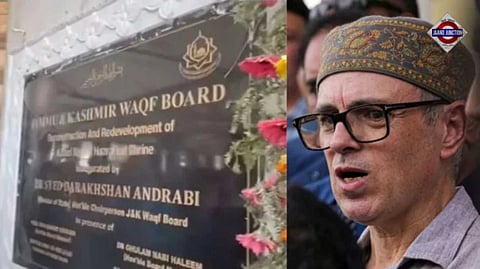

A major controversy erupted on Friday after a group of people vandalised a renovation plaque at the Hazratbal mosque in Jammu and Kashmir that bore the national emblem. Chief Minister Omar Abdullah supported the action, questioning the necessity of placing the Ashoka Emblem at a religious site, while Governor Manoj Sinha said he was "deeply anguished" over the vandalism.
The inclusion of the Emblem on the Srinagar mosque’s renovation plaque -- home to a relic of Prophet Muhammad -- sparked outrage among local leaders and worshippers, ultimately leading to its desecration.
Chief Minister Abdullah questioned the necessity of including the emblem on the plaque at the shrine and criticised the invocation of the Public Safety Act (PSA) against those involved in the vandalism.
“What was the need for an emblem and the stone in the first place? Wasn’t the work already sufficient?” he asked. Referring to the PSA, he added, “First, you hurt the religious sentiments of people, and then you do this. What’s the point?”
However, expressing his anguish, Governor Sinha said the Ashoka Emblem represents the nation’s sovereignty and pride and said hurting national sentiments will not be tolerated.
"Deeply anguished by the vandalism of the Ashoka Emblem on the renovation plaque at Hazratbal Shrine. Ashoka Emblem is the symbol of our sovereignty & national pride. Such acts hurt our national sentiments & will not be tolerated. Strong action will be taken against miscreants," he tweeted.
Srinagar police have registered an FIR against unknown individuals in connection with the incident.
The chairperson of the Jammu and Kashmir Waqf Board, Darakshan Andrabi, had earlier demanded strict legal action, including invoking the PSA, against those who removed the emblem. She asserted that the individuals responsible for breaking the plaque were attempting to disrupt peace and must be treated as offenders under the law.
“This is not just damage to stone. This is damage to the Constitution,” she said at a press conference in Hazratbal. She also questioned whether leaders who oppose the emblem reject its presence on currency notes.
Devotees and political figures, including members of the ruling National Conference (NC), argued that displaying a sculpted figure in a place of worship violates Islamic principles, which strictly forbid idol worship.
National Conference spokesperson and Zadibal MLA Tanvir Sadiq objected to the emblem, saying placing a sculpted symbol in a religious space goes against Islamic beliefs. He said that Islam strictly forbids idol worship and the emblem’s presence violated the principles of Tawheed.
"I'm not a religious scholar, but in Islam, idol worship is strictly forbidden - the gravest of sins. The foundation of our faith is Tawheed (Islamic concept of monotheism). Placing a sculpted figure at the revered Hazratbal Dargah goes against this very belief. Sacred spaces must reflect only the purity of Tawheed, nothing else," Sadiq tweeted.
People’s Democratic Party (PDP) leader and former Chief Minister Mehbooba Mufti also weighed in on the controversy, defending the vandalism. She said that placing the national emblem at the shrine amounted to blasphemy.
"Hazratbal is connected to our Prophet Muhammad and any sort of blasphemy is not acceptable to Muslims. If you do any sort of thing at that place that is unacceptable and considered blasphemy for Muslims, then it is not okay. This is not against the emblem, but as our religion is against idol worship, and this act was against that," she said. "
Srinagar MP Aga Ruhullah Mehdi defended those who removed the plaque, framing it as a response to what he saw as an attempt to exploit a religious site for political display.
“Efforts to monumentalise personal egos within Hazratbal are not acts of devotion but of arrogance. A sacred site that has stood for centuries requires no nameplate to assert its legitimacy. People were rightfully offended by this dangerous attempt to manipulate religious sensitivities for self-glorification,” Mehdi wrote in a post on X.
